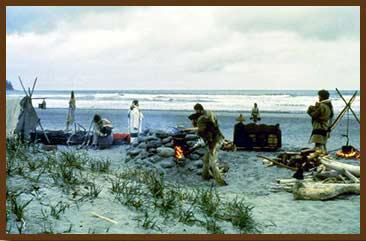Re-enactment of the salt works operations by interpretive staff at Fort Clatsop National Memorial, National Park Service.
Early Roman soldiers received an allowance of salt, which was called a salarium—a “salary.” A good soldier had to be “worth his salt.” What sort of salaries did the men of the Corps of Discovery earn? In 1807 Congress authorized double pay for the 31 officers, enlisted men, and civilian employees of the Corps. Base pay for privates in the U.S. Army was $5 per month, for corporals $7, and for sergeants $8. The majority of the privates were paid a total of $333.33 for 33+ months of service; brothers Joseph and Reubin Field received $383.32-1/3 for 37 months.[1]Donald Jackson, ed., Letters of the Lewis and Clark Expedition with Related Documents, 1783-1854 (Second edition; 2 vols., Urbana: University of Illinois Press, 1978), II:377-78. Each enlisted man received 320 acres of land anywhere west of the Mississippi where surveyed public land was for sale.[2]The federal Land Act of 1804 established the value of western public lands at a minimum of $1.64 per acre, down from the previous price of $2.00. In modern terms, one acre of land is equal to about … Continue reading
Basic pay for captains was $40 per month, plus a subsistence allowance. Meriwether Lewis received a total of $2,776.22, including $893.64 subsistence, for 47 months and two days, beginning 1 April 1803, and ending with his resignation from his commission on 2 March 1807. He was also given 1,600 acres of land.
Army Scale
Lewis had asked Secretary of the Army Henry Dearborn to re-enlist William Clark at his former rank of captain, but Congress had drastically reduced the size of the peacetime army, and Dearborn was powerless to comply, so he appointed Clark a second lieutenant in the Corps of Artillerists instead. Nevertheless, Lewis always introduced Clark as his co-captain, and the enlisted men apparently never knew the truth. Clark’s pay, at a lieutenant’s $30 a month, came to $2,113.74, including $823.74 subsistence, for the 43 months from 1 August 1803, through 28 February 1807. He also received 1,600 acres. The two civilian employees, George Drouillard and Toussaint Charbonneau, earned $1,666.66 and $818.32, respectively. York and Sacagawea received nothing.
A comparison of the U.S. Army’s monthly pay scale in 1803-06 with that of 1999 illustrates the difference in the value of the dollar. In 1999 privates earned from $888 to $1,275 per month; corporals up to $1,429; sergeants up to $1,500; lieutenants from $1,800 to $2,300; captains from $3,200 to $3,800.
Salt of the Earth
In the Old Testament of the Bible, salt is a metaphor for what is most useful, and for whatever stimulates an appetite. In the New Testament it symbolizes persons of exceptional worth—of loyalty and dedication as abiding as the savor of pure salt. In his report to Secretary of War Henry Dearborn in January 1807, Captain Lewis directed attention to the service records of several of his men.
Of Privates Joseph and Reubin Field he wrote: “Two of the most active and enterprising young men who accompanied us. It was their peculiar fate to have been engaged in all the most dangerous and difficult scenes of the voyage, in which they uniformly acquited themselves with much honor.”
Of Private John Shields: “Nothing was more peculiarly useful to us, in various situations, than the skill and ingenuity of this man as an artist, in repairing our guns, accoutrements, &c. and should it be thought proper to allow him something as an artificer, he has well deserved it.”
George Drouillard, Lewis wrote, was: “A man of much merit; he has been peculiarly usefull from his knowledge of the common language of gesticulation, and his uncommon skill as a hunter and woodsman; those several duties he performed in good faith, and with an ardor which deserves the highest commendation. It was his fate also to have encountered, on various occasions, with either Captain Clark or myself, all the most dangerous and trying scenes of the voyage, in which he uniformly acquitted himself with honor.”
Others worthy of special mention were Private François Labiche, an interpreter; Corporal Richard Warfington, who commanded the barge (called the ‘boat’ or ‘barge’ but never the ‘keelboat’) on its return to St. Louis from Fort Mandan; and even young John Newman, who had striven mightily to redeem himself despite being punished for “mutinous expressions” by a lashing and dismissal from the Corps.
Thus did Captain Lewis measure the worthiness of these particular men, “the salt of the earth.”[3]Jackson, I:366-69.
Notes
| ↑1 | Donald Jackson, ed., Letters of the Lewis and Clark Expedition with Related Documents, 1783-1854 (Second edition; 2 vols., Urbana: University of Illinois Press, 1978), II:377-78. |
|---|---|
| ↑2 | The federal Land Act of 1804 established the value of western public lands at a minimum of $1.64 per acre, down from the previous price of $2.00. In modern terms, one acre of land is equal to about nine-tenths of the area of a football field. |
| ↑3 | Jackson, I:366-69. |

